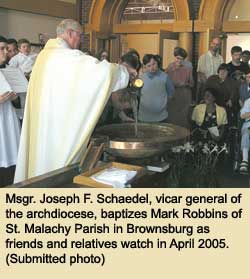Evangelization Supplement
A sense of belonging:
Program reaches out to Catholics with disabilities
By John Shaughnessy
 Roni Wyld asks you to listen to just one story—a story about a woman who desperately wanted what many people seek in life: a sense of belonging and connection.
Roni Wyld asks you to listen to just one story—a story about a woman who desperately wanted what many people seek in life: a sense of belonging and connection.
“Benita was 40 and mildly disabled,” recalled Wyld, the director of the archdiocese’s Special Religious Education (SPRED) program. “She wasn’t going to church. She told her mother it was because she didn’t feel she belonged at church. Her mother came to a meeting about SPRED and told Benita about it. Benita said she would only come once.”
During that visit, something clicked for Benita as she watched the effort to welcome people with developmental disabilities into a small community of faith within her parish.
“Within one month, she told her mother she wanted to go to church,” Wyld continued. “By Holy Thursday, she was a greeter with me. She hugged people, said ‘hi’ and took up the gifts. SPRED gives people another entrance into church. We don’t try to separate people. The goal is for them to become part of the parish community. Benita is the shining example of that.”
The SPRED program is designed to reach Benita and the other nearly 4,000 Roman Catholics with disabilities in the archdiocese. Wyld is hoping to expand the program, which currently involves people from 22 parishes, including Benita’s parish—St. Malachy in Brownsburg.
“It’s just wonderful to see and to know that the Church is getting involved in this way,” said Father Daniel Staublin, the pastor of St. Malachy Parish. “It’s a great sign that we try not to leave anyone behind. It puts the face of Christ on everyone. And the people who get involved in the program get as much out of it as those they’re helping.”
In its 10th year in the archdiocese, SPRED trains up to eight volunteers from a parish, helping them create a small community of faith for people with developmental disabilities.
Wyld said the program has found a powerful home in the Richmond parishes of Holy Family, St. Andrew and St. Mary, under the direction of Father Todd Riebe.
“Father Todd is wonderful in welcoming the group,” Wyld said. “During Lent, they had Stations of the Cross for the community. It lets people see people of special needs as another member of the parish, that they need the sacraments as much as others do.”
Denise Gray has noticed that connection in her four years as a leader of the SPRED program in Richmond.
“I felt a calling to do something with the Church,” said Gray, a member of St. Andrew Parish. “It’s just a wonderful program. Anyone who has the slightest interest in getting involved should.
“It really brings the Word of God more concretely to our friends, and quite frankly to ourselves. Sometimes, we make our faith too complicated for ourselves. Just trying to share the message with our friends makes us think about it a little more concretely.”
Wyld has felt that impact, too.
“To me, SPRED is the one place where the Holy Spirit is most evident in my life,” Wyld said. “You go to groups and you can just feel that sense of the Holy Spirit being there. Awesome things happen in groups.”
That leads to another story from Wyld. It’s about a man named Ted. He’s autistic and has been a member of SPRED for eight years. With his disability, Ted often repeats what people say to him, but he doesn’t share his own thoughts. At least he didn’t until one special moment in a SPRED session.
“In our sessions, we set up an altar,” Wyld recalled. “There was a statue of two people hugging—the prodigal son and his father. Debbie Armenta [one of the instructors] was going around the circle and showing it to everybody, saying, ‘Do you see them hugging? Do you see how happy the man’s face is?’ Ted reached out and grabbed the statue and just said, ‘Amen!’ It was the first time all year he said something on his own. That’s why I’m involved in SPRED.”
Tears welled in Wyld’s eyes as she shared that story.
“We find Christ in our relationships,” she said. “I love working with people who have special needs. They have a clear concept of God and their relationship with him. They know he exists and they know he loves them. Their belief that God loves them is simple and clear.” †
